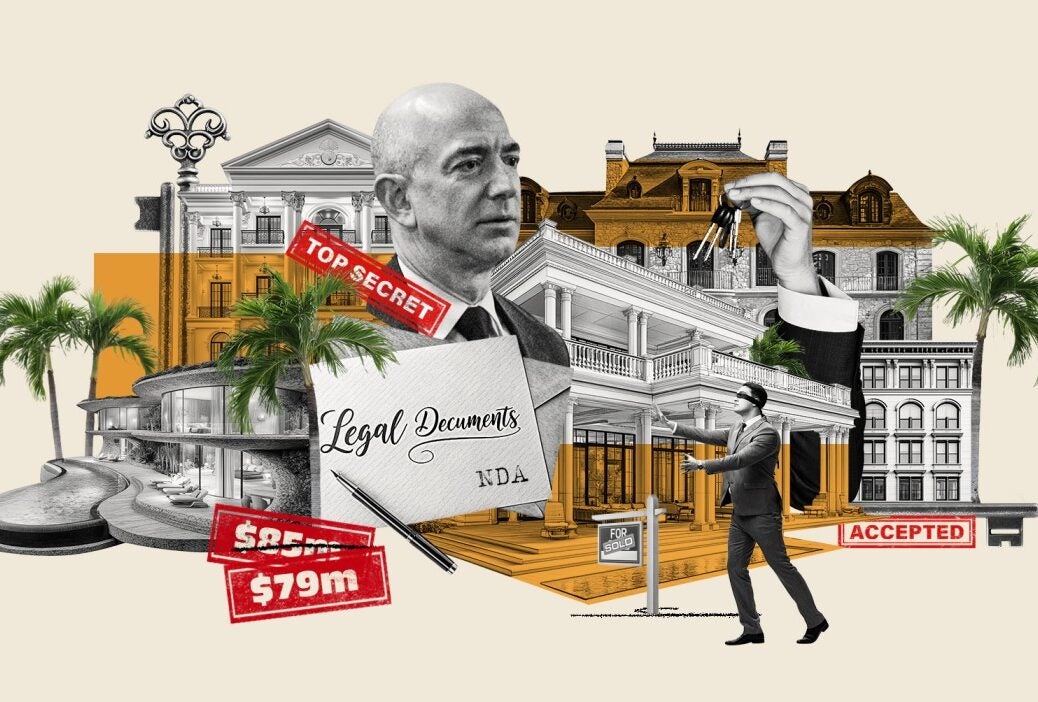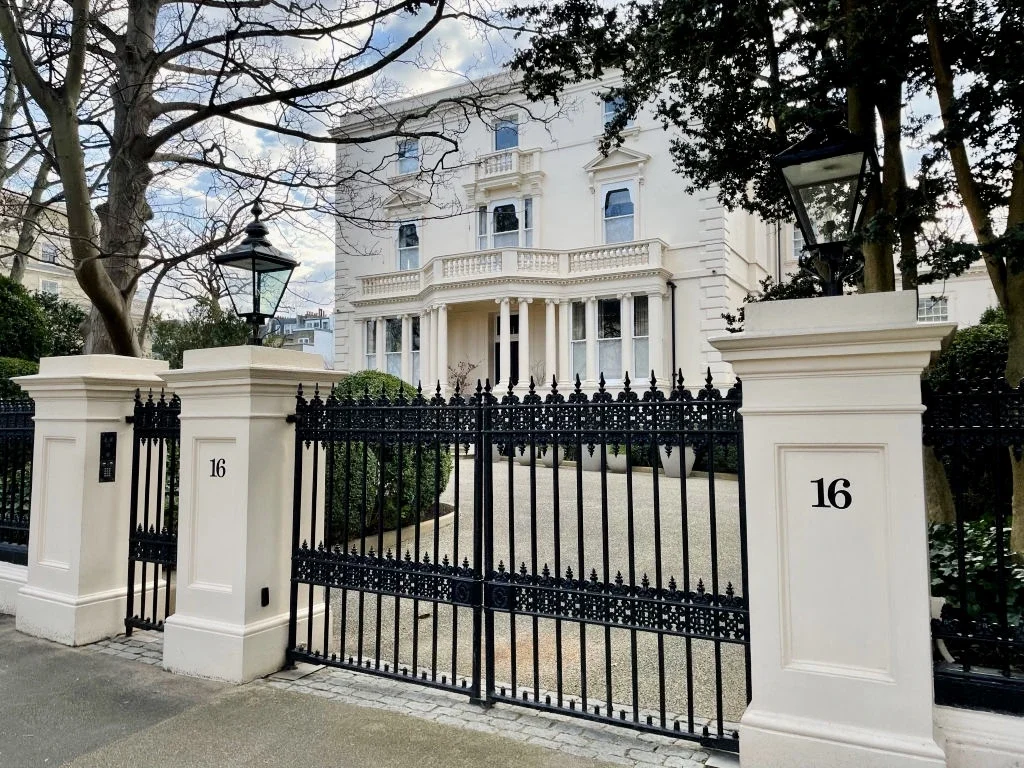
Everyone wants to sell their home for the highest price possible – and the super-rich are no exception.
In 2023 Leo Kryss, a Brazilian toys and electronics tycoon, put his mansion in Miami on the market for $85 million. An anonymous buyer offered to pay $79 million for it, and Kryss accepted, but after the sale he discovered the buyer was Jeff Bezos, the second richest man alive.
Kryss claims he would not have shaved $6 million off the price if he had known Bezos was the buyer, so he decided to sue the real-estate broker who had handled the sale for keeping the identity of the Amazon founder a secret.
When the super-rich and famous buy luxury properties around the world, the deals are typically shrouded in secrecy. In the US, purchases are often bound by non-disclosure agreements (NDAs), contracts that prevent the parties involved from disclosing information to third parties.
[See also: ‘Once-in-a-decade’ apartment at The Glebe Chelsea comes to market at £40 million]
The prenup of the property world
And NDAs are increasingly being used in the UK. ‘They are relatively common at the very top end of the market,’ says Lindsay Cunningham, senior counsel at Farrer & Co.
‘We live in a technological age where information can spin around the globe in a millisecond,’ says Peter Wetherell, founder and executive chairman of Wetherell. ‘NDAs mean a higher level of trust and discretion towards the client and the property. It’s the prenup of the property world.’
Many of the buyers and sellers who insist on NDAs are in the public eye, such as celebrities, athletes, high-profile business people and even royalty. And, for them, security is paramount.
‘Our clients take their privacy very seriously, even to the extent of employing staff to monitor their children’s social media,’ says Henry Sherwood, managing director of The Buying Agents. ‘They certainly wouldn’t want their new address in the public domain.’
Buying agents are often asked to sign NDAs before they can see a luxury off-market property on behalf of their client, or even receive the details.
[See also: Navigating the ongoing challenges of UK real estate]
For buyers, NDAs can mean sellers may be forthcoming about information if they know it is protected, explains Lucy Barber, partner and head of residential property at Forsters. ‘Buyers may also feel better protected from gazumping if the number of people with knowledge about the sale is more limited than usual,’ she adds.
In addition, buyers can use an NDA to prevent information about their new home from leaking out. ‘This involves including specific contractual provisions requiring estate agents to keep photographs and other details off social media and also to remove them from websites,’ Cunningham says. ‘Buyers should also request that the copyright of any photographs should be assigned to them on completion.’

Even though it prevents agents from burnishing their reputations by advertising their high-profile deals, NDAs can be advantageous for them too, says Jack Hudson, director, private clients at CBRE. ‘They help preserve relationships and trust by maintaining the confidentiality high-end clients expect,’ he says.
Yet anonymity can be a double-edged sword.
Kryss’s case is particular in that, according to court documents, he claims the broker firm, Douglas Elliman, misled him by directly assuring him that Bezos was not the person offering to buy the house anonymously, and also that the buyer would not pay more than $79 million. Douglas Elliman, which has declined to comment on the case, has filed a motion to dismiss the suit.
More generally, NDAs could lead to sellers feeling misled if they are unaware of the buyer’s true identity, especially during negotiations around pricing.
‘Transparency about the counterparty can sometimes affect the deal’s terms, and if sellers feel they’ve undersold due to lack of information, disputes may arise,’ Hudson says. ‘However, while it’s true that something is only worth what someone is willing to pay, just because a buyer can afford more doesn’t mean they’re obliged to offer more.’
[See also: Steadier times to come for the prime central London property market?]
Property NDAs in the UK
Property experts agree, though, that a Bezos scenario would be unlikely to happen in the UK.
‘I would strongly advise any buyer against any attempt to withhold their identity,’ says Roarie Scarisbrick, partner at Property Vision. ‘They simply won’t be taken seriously by sellers, and their agents need to know exactly who they are dealing with before they will enter any negotiations, let alone shake hands on a deal. Many won’t even open the door without knowing who is coming.’
There are also strict anti-money-laundering (AML) laws in this country that require agents, lawyers and surveyors to know the identity of the buyer – or the ultimate beneficial owner of a company or trust – and their source of funds.
[See also: Financial crime: why the wealthy should worry about sanctions]
‘No deal can be struck without the seller and their team knowing the inside leg measurement of a buyer, so why try to be clever in the negotiation?’ Scarisbrick says. ‘I don’t see how the Bezos case could happen here, unless someone was prepared to be disingenuous.’
NDAs have other downsides. When one is used, anyone privy to or advising on the transaction will be asked to sign it, including estate agents and buying agents, solicitors (although they are already bound by a duty of confidentiality), surveyors and architects. ‘It can even extend to someone coming to test the air conditioning,’ Cunningham says.

‘Getting all these people to sign can slow a transaction quite considerably and potentially risk jeopardising it if one side becomes overly frustrated by the delay.’ Also, if information does leak out it can be very difficult to prove the origin of the breach. And, in any case, NDAs don’t cover everything. As Barber points out, in the UK, once the transaction is registered at the Land Registry, the purchase price will be published.
Also, since 2022, in a bid to increase transparency and tackle money laundering and tax evasion, foreign businesses owning land or properties in Britain have been required to disclose their ultimate beneficial owners in a register of overseas entities.
Ultimately, the key to buying and selling luxury property privately is trust and dealing only with those you can rely on to be discreet, says Richard Rogerson, CEO of RFR.
[See also: What UHNWs can learn about home security from £10 million London mansion heist]
‘For instance, do you trust the sales agent and can they lock down systems in their company so that if someone high-profile is coming to a viewing that information is not available to their colleagues?’ he says. ‘Transactions can and do remain private if you have the right team around a client, but you have to be honest and warn them that nothing is foolproof.’
In any case, NDAs are certainly no guarantee of secrecy. ‘I doubt they are very often actually enforced,’ Rogerson says.
‘You’d be amazed by the number of times someone has said to me, “I signed an NDA so I probably shouldn’t tell you this, but…”’
This feature first appeared in Spear’s Magazine Issue 94. Click here to subscribe







